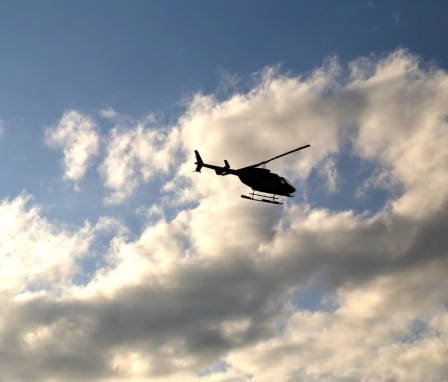Flight Nurse Career and Salary Outlook

Are you ready to earn your online nursing degree?
 Credit: Douglas Sacha / Moment / Getty Images
Credit: Douglas Sacha / Moment / Getty ImagesA flight nurse is a highly trained healthcare professional who delivers pre-hospital patient care aboard an aircraft. These nurses are part of a critical care team that treats extremely compromised patients in an unstable environment. Typically, a flight nurse’s patients have either undergone significant trauma that requires speedy evacuation to a medical facility or quick transport from one hospital to another.
Military flight nurses working overseas may treat soldiers who have been wounded on the battlefield. The common trait shared by all flight nurses is their ability to administer life-sustaining care in a high pressure environment.
What is a Flight Nurse?
In many cases, the flight nurse’s actions save lives. The rigorous training and experience required for this job, and the extreme work environment, ensure professionals earn a high salary. According to PayScale, the median salary for an entry-level flight nurse with full credentials is $71,353 per year. Additionally, nursing jobs as a whole are expected to grow steadily, with the Bureau of Labor Statistics projecting a 7% increase in nursing jobs from 2019-29.
What Do Flight Nurses Do?
Flight nurses aid in medical evacuations — commonly known as life flights — to treat trauma victims. These patients have been injured so grievously that standard ground transportation may risk the patient’s life. Flight nurses stabilize these patients as much as possible, providing emergency care and preparing the patient for treatment. Duties range from basic first aid to starting IVs, administering medication, or performing advanced resuscitation techniques.
Another common scenario involves patient transfer between facilities. Patients might need to be moved to obtain lifesaving treatment unavailable at the original facility, or to relocate to another part of the country for other reasons. Secondary to patient comfort and safety, flight nurses liaise with medical professionals at the receiving facility, ensuring all case notes and patient files get to the right person.
Where Do Flight Nurses Work?
Flight nurses work on helicopters and fixed-wing aircrafts, including propeller and jet planes.
Potential Work Settings:
How to Become a Flight Nurse
To specialize as a flight nurse, individuals should obtain registered nursing (RN) licensure. This requires either an associate degree in nursing (ADN) or a bachelor of science in nursing (BSN). After completing academic requirements, RN candidates must pass the NCLEX-RN exam, which evaluates their foundational knowledge or nursing practice.
RN candidates apply for RN licensure from their state’s regulatory board. To learn about the specific requirements to earn licensure, such as the number of clinical hours needed, check the state law first.
After earning licensure, flight nurse candidates must complete 3-5 years of experience as an RN, usually in the ICU or ER. They can then apply for certification as a flight or air transport nurse. Military flight nurses need several weeks of specialized training as well.
Education and Experience
RN licensure requires either an ADN or BSN. An associate degree typically lasts two years for full-time students, while a bachelor’s degree takes four years to complete. An ADN usually includes foundational nursing classes, teaching RNs the essentials of nursing. A BSN includes more general education courses, and students may take more specialized nursing courses than are available through an ADN.
After completing their degrees and earning licensure, RNs should build their experience. Working in a high-pressure environment like an ICU or ER can serve as invaluable on-the-job training before becoming a flight nurse. RNs need at least 3-5 years of practice in this work environment, although the more experience, the better.
Flight Nurse Salary and Job Growth
The Bureau of Labor Statistics (BLS) does not provide job and salary data for flight nurses specifically, but the BLS database shows that RNs overall make median annual salaries of about $73,300. Data collected by PayScale notes that flight nurses earn an average yearly salary of $71,353. PayScale data also shows that salaries for flight nurses generally range from $58,000-$102,000.
Additionally, the BLS projects that the number of available RN jobs could increase by about 222,000— or 7% — from 2019-29. The BLS attributes this projected increase to the number of baby boomers who require increased medical attention as they age.
Flight Nurse Frequently Asked Questions
How hard is it to become a flight nurse?
Becoming a flight nurse takes a considerable amount of dedication. Flight nurses cannot go into the field right away; instead, they need the proper educational preparation, years of experience, and certification.
How long does it take to become a flight nurse?
It can take anywhere from 5-12 years to become a flight nurse. Some can become a flight nurse in five years with an ADN and three years of experience. However, because of the intense nature of the job, it usually takes more preparation to enter this career. Very often flight nurses pursue a four-year bachelor’s degree and need at least five years of experience. RNs can expect to dedicate about nine years to becoming a flight nurse.
Is being a flight nurse dangerous?
It can be. Adverse weather or environmental conditions can increase the risk of danger when working as a flight nurse. In fact, the Washington Post reported that working on a medical helicopter is the second most dangerous job after commercial fishing. It’s certainly important to know these risks before looking for flight nurse jobs.
How much do flight nurses make?
Flight nurses make anywhere from $58,000-$102,000, according to PayScale. Entry-level nurses make an average salary of $51,059, while experienced flight nurses earn about $80,000 annually.
Explore Related Resources
Are you ready to earn your online nursing degree?
Whether you’re looking to get your pre-licensure degree or taking the next step in your career, the education you need could be more affordable than you think. Find the right nursing program for you.


